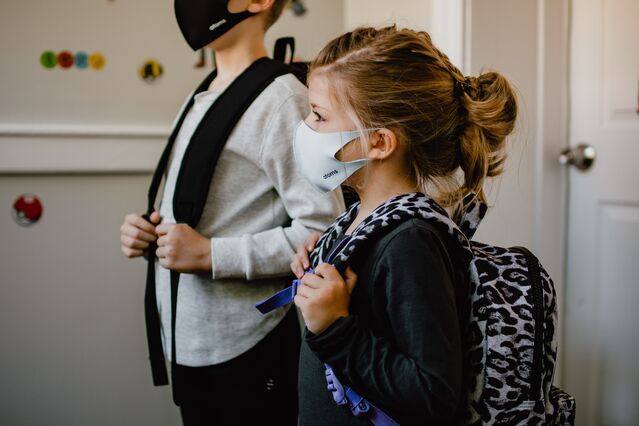Stress
Helping Children Turn Down the Stress Dial
These cognitive strategies may be the gamechanger you’ve been looking for.
Posted April 19, 2022 Reviewed by Vanessa Lancaster
Key points
- Avoiding stressful thoughts and situations can help with stress management, but only short-term.
- Accepting and labeling distressing emotions can decrease arousal and prepare us to face a stressor.
- Repeated exposure to anxiety-inducing experiences helps us adapt to them over time.

I was mid-sentence in a lecture on stress management techniques when I got a call from my child’s elementary school.
“Sorry to bother you,” the school nurse murmured, “but your daughter said she feels like she’s going to throw up and looks very pale.”
I quickly ended the call and arranged for her to be taken home.
I discussed with my daughter the day's events, and she seemed to be doing fine.
However, the following day, her complaints grew increasingly worse as the time for school approached.
“Mom, I don’t want to go to school. My stomach really hurts. I’m afraid I’m going to be sick at school again.”
Suppression
That day I let my daughter stay home from school. I wasn’t sure if she had a stomach bug or if her tummy troubles were from anxiety.
The next day the same pattern happened. As the time to go to school neared, she became more distressed. When she was told she could stay home, her symptoms disappeared.
This was out of character for my sweet 6-year-old, who typically enjoyed the fun of kindergarten. Once again, I let her stay home from school. The strategy of ignoring the stress of school worked great to reduce her distress. Her stomach ache went away, her worries and anxiety were gone, and she had nothing to fear until the next morning when it would happen all over again.
Avoiding or downplaying problems, also known as suppression or repressive coping, can be very effective short term. There are cases where you may need to ignore or keep stressful triggers at arms-length. For example, if you received a hurtful text message from your significant other immediately before a job interview, you may need to stifle your emotions until you have time to process them.
Of course, ignoring stress often exacerbates things in the long run. For example, people with phobias have increased anxiety the longer they avoid their fears. Just as students with social anxiety have worse symptoms the more they stay home from school. As Myers and DeWall (2017) stated,
Reinforcement helps maintain learned fears and anxieties. Anything that enables us to avoid or escape a feared situation can reinforce maladaptive behaviors. Fearing a panic attack, we may decide not to leave the house. Reinforced by feeling calmer, we are likely to repeat that behavior in the future. (p. 577)

Missing class wasn’t going to serve my daughter as a long-term strategy.
Rational Coping
I knew allowing my daughter to continue skipping school would set an unhealthy precedent, so I pressed her more on what was worrying her. With warmth and patience, we discussed all of the possible scenarios she might encounter at school.
What if she vomited on the floor in front of her classmates? What if she couldn’t get a hold of me? What if her teacher wouldn’t let her go home? Together we talked through what she might be able to do in any of the possible situations, and I assured her that her teacher and I were on her side to help.
This cognitive strategy for stress management is called rational coping. This method of facing a stressor and working to overcome it involves three steps:
1. Acceptance. With my help, my daughter came to understand what she was fearful of and acknowledge that it won’t simply go away by avoiding school. We were able to do what Dan Siegel calls, “name it to tame it.” Simply verbalizing her emotions (affect labeling) decreased her distress.
2. Exposure. Together we confronted all of the ways things could go awry at school without skirting around any feared situations. This step may be particularly difficult for people confronting severe stress. For example, victims of rape trauma may struggle even to accept that the rape occurred since the initial impulse is often to live as if it never happened.
One study asked rape survivors to record a verbal recounting of the traumatic event and listen to it daily. While mentally reliving their horrific experience was upsetting, researchers found that this prolonged exposure significantly reduced symptoms of anxiety and post-traumatic stress disorder compared to more gradual therapies.
3. Understanding. The final component of rational coping is to find the meaning of the stressor in your life. My daughter and I worked together to make sense of what she was feeling and the actions she could take to face her fears.
Reframing
The last step I took to help my daughter return to school was to reframe the stressor. She had been fearful that she would get to school, start feeling sick, and have no one to help her. We talked about what can happen inside her body when she starts feeling anxious.
Her stomach can tense, her head can get hot, her palms can sweat, her heart can pound, and her breathing can speed up. We dwelled on this uneasy feeling when she thought about going to school.

Knowledge is power. I did what many other parents might do and explained to her that the distressful feeling in her stomach would decrease each time she went to school.
If research tells us that avoiding anxiety-inducing situations intensifies our fears, then intuition tells us that facing them will gradually decrease their power over us.
I helped my daughter reframe the behavior that was being asked of her. Instead of focusing on the relief she would get from avoiding school, we focused on the decrease in stress each time she attends. As expected, her first day back was difficult for her.
My heart ached as I left her in tears in the arms of her teacher. Thankfully her teacher reported that she had recovered quickly and engaged in the day's activities.
After just two days of attending, she gleefully voiced that her stomach had been doing a lot better.
While not every taxing situation can be tied up so neatly with a bow, using strategies of suppression, rational coping, and reframing can be a helpful starting point in managing stress.




